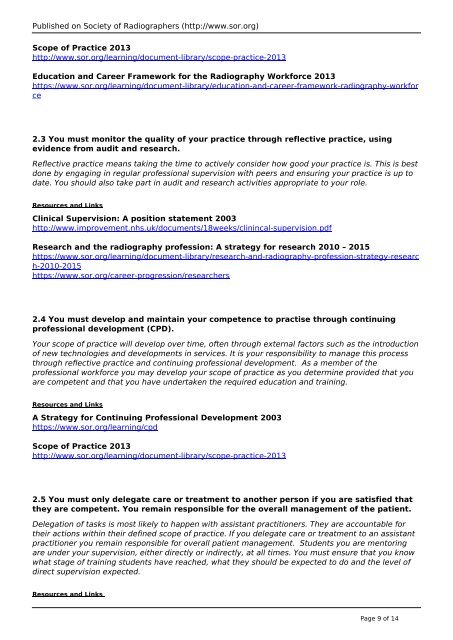SOR_professional_standards_practices
Create successful ePaper yourself
Turn your PDF publications into a flip-book with our unique Google optimized e-Paper software.
Published on Society of Radiographers (http://www.sor.org)<br />
Scope of Practice 2013<br />
http://www.sor.org/learning/document-library/scope-practice-2013<br />
Education and Career Framework for the Radiography Workforce 2013<br />
https://www.sor.org/learning/document-library/education-and-career-framework-radiography-workfor<br />
ce<br />
2.3 You must monitor the quality of your practice through reflective practice, using<br />
evidence from audit and research.<br />
Reflective practice means taking the time to actively consider how good your practice is. This is best<br />
done by engaging in regular <strong>professional</strong> supervision with peers and ensuring your practice is up to<br />
date. You should also take part in audit and research activities appropriate to your role.<br />
Resources and Links<br />
Clinical Supervision: A position statement 2003<br />
http://www.improvement.nhs.uk/documents/18weeks/clinincal-supervision.pdf<br />
Research and the radiography profession: A strategy for research 2010 – 2015<br />
https://www.sor.org/learning/document-library/research-and-radiography-profession-strategy-researc<br />
h-2010-2015<br />
https://www.sor.org/career-progression/researchers<br />
2.4 You must develop and maintain your competence to practise through continuing<br />
<strong>professional</strong> development (CPD).<br />
Your scope of practice will develop over time, often through external factors such as the introduction<br />
of new technologies and developments in services. It is your responsibility to manage this process<br />
through reflective practice and continuing <strong>professional</strong> development. As a member of the<br />
<strong>professional</strong> workforce you may develop your scope of practice as you determine provided that you<br />
are competent and that you have undertaken the required education and training.<br />
Resources and Links<br />
A Strategy for Continuing Professional Development 2003<br />
https://www.sor.org/learning/cpd<br />
Scope of Practice 2013<br />
http://www.sor.org/learning/document-library/scope-practice-2013<br />
2.5 You must only delegate care or treatment to another person if you are satisfied that<br />
they are competent. You remain responsible for the overall management of the patient.<br />
Delegation of tasks is most likely to happen with assistant practitioners. They are accountable for<br />
their actions within their defined scope of practice. If you delegate care or treatment to an assistant<br />
practitioner you remain responsible for overall patient management. Students you are mentoring<br />
are under your supervision, either directly or indirectly, at all times. You must ensure that you know<br />
what stage of training students have reached, what they should be expected to do and the level of<br />
direct supervision expected.<br />
Resources and Links<br />
Page 9 of 14

















